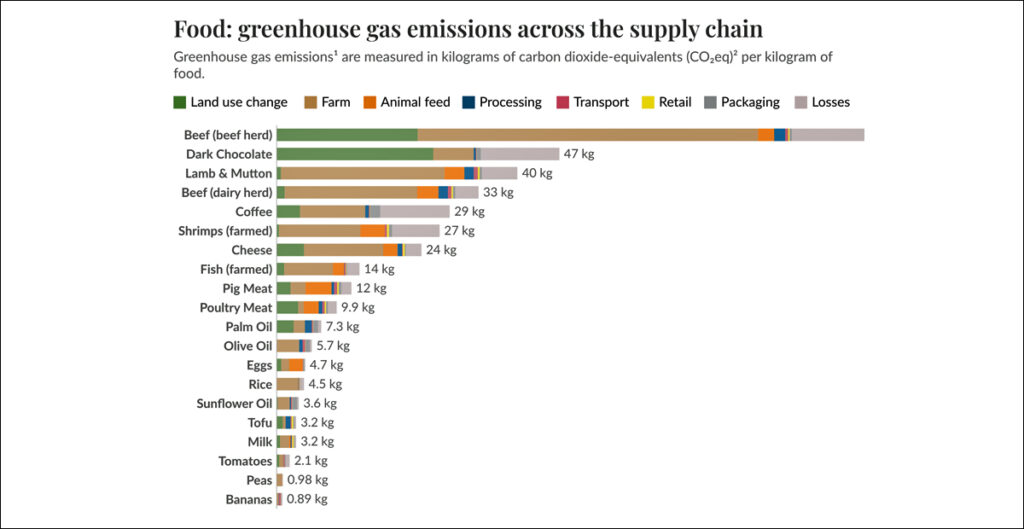By Karen Dougherty, C-Change Conversations
How many times a week do you typically eat beef? Did you know that dropping that number, even by one, would help solve climate change?
It’s true. There is a strong relationship between meat consumption and our rising temperatures. Choosing a meatless meal is great, but even replacing steak with chicken, or ground beef with ground turkey, makes a whopping difference.
Why is there so much focus on beef? The main reasons are methane, land and resources. Add these together and the impact of beef consumption on heat-trapping emissions is staggering.

Methane
When we think of heat-trapping gas, carbon dioxide comes to mind first. Rightfully so – it is the biggest offender, and it lingers in the atmosphere for a very long time. But another major culprit is methane.
Methane is especially problematic because, although it dissipates from the atmosphere faster than CO2, it has at least 25 times the heat-trapping potency. Methane is responsible for 20-30% of the temperature increases due to climate change, so decreasing its levels is one of the quickest and easiest ways to slow down warming.
Cows are a major source of methane. The unique digestive system of ruminant animals like cows, sheep, and goats is to blame. Methane is a by-product of their digestion, released into the air through their gas. With over 1.5 billion cows on the planet, the problem is immense.
There are some cool solutions being studied to reduce the amount of methane coming from cows. One fascinating example is adding seaweed to their diets. It significantly reduces methane emissions. Solutions like these are coming, but aren’t quite ready for widespread adoption.
Land
Raising animals for food requires a lot of land, and larger animals take up more space. Although it doesn’t seem like it when you fly across the Midwest, farmland is a limited resource. The more land we use for cattle, the less we have for growing crops. Massive amounts of land are also needed just to grow enough food to keep cattle fed.
Did you realize one driver of deforestation in the Amazon is to clear land for cattle? Americans have such an appetite for red meat we can’t fulfill our needs domestically, so we import from other countries, including Brazil.
Resources

In addition to needing more space, bigger animals use more resources. They eat more, drink more water and require more energy to raise and process – and to be transported around the country or the world. Slowing our intake of beef would reduce emissions from all these sources.
Other benefits
I’m a big fan of climate solutions with multiple benefits. If we cut back on red meat consumption, there are other wins for us, namely saving money and improving our health. Beef is generally more expensive than other animal proteins, and a diet high in red meat is linked to increased rates of certain cancers, type 2 diabetes and heart disease.
Nobody is going to force us to stop eating beef, but if we choose to make even small changes to our consumption, it could be a win-win for our health, our budgets and our climate.
Karen Dougherty writes the B-Change blog for C-Change Conversations, a national nonprofit that provides nonpartisan education on climate change, and also blogs about climate change at unheating.com. Banner photo: Cattle on a ranch (iStock image).
Sign up for The Invading Sea newsletter by visiting here. To support The Invading Sea, click here to make a donation. If you are interested in submitting an opinion piece to The Invading Sea, email Editor Nathan Crabbe at ncrabbe@fau.edu. To learn more about the impact of cows on climate change, watch the video below.



